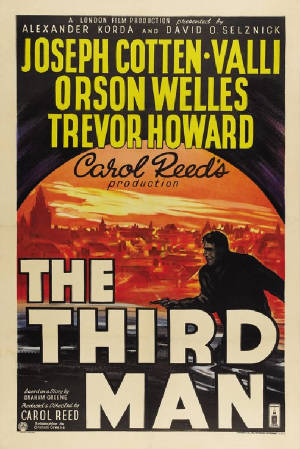|

(1949, directed by Carol Reed)
- inducted 2013 -
"From the moment Anton Karas’ iconic zither score starts up, The Third Man draws
the viewer in to its murky, morally compromised world, defined by the particular post-World War II makeup of its setting,
Vienna. It’s no coincidence that the movie’s protagonist, Holly Martins (Joseph Cotten), is a writer of dime-store
Westerns; Vienna itself is like the Wild West, full of outlaws and competing authorities, home to a thriving black market.
None of the characters are white hats or black hats, though; Holly is the closest thing the movie has to a hero, and even
he ends up emotionally scarred and morally compromised by the end.
"Director Carol Reed shoots the corrupt Vienna from a constantly skewed perspective, making extensive use of Dutch angles
and ominous shadows. Nearly every person in the city looks suspicious; no one merely stands or leans when they can lurk. Holly
himself is constantly eyed with suspicion as he tries to find out what happened to his old friend Harry Lime (Orson Welles),
who has apparently died under mysterious circumstances. That Harry is in fact alive isn’t a surprise so much as an inevitability
(Welles’ name is, after all, right there in the opening credits), but his first appearance, an hour into the film, is
nevertheless a sort of shock, his devilish grin piercing through the gloom of the dysfunctional city.
"Welles essentially gets two scenes, one of which is Harry’s deservedly iconic speech to Holly as they look down on
the city from a ferris wheel, and Harry is more of a specter than an active participant in the story. He haunts the city,
he haunts Holly, he haunts the British officer determined to take down his black-market operation. Perhaps most of all he
haunts his girlfriend Anna (Valli), who clothes herself in his monogrammed pajamas and refuses to stop loving him, no matter
how much she learns about his awful deeds. Holly may kill Harry (for real this time) in the end, but his presence is no weaker
for his physical body being gone. Like the war itself, Harry is a demon that Vienna and its inhabitants will be unable to
shake for a very long time."
~ Josh Bell
Principal cast: Joseph Cotton, Alida Valli, Orson Welles, Trevor Howard, Bernard Lee, Paul Hörbiger, Ernst
Deutsch, Siegfried Breuer, Erich Ponto, Wilfrid Hyde-White, Hedwig Bleibtreu
Screenplay by Grahame Greene, with uncredited contributions by Alexander Korda (story), Carol Reed, and Orson Welles
Based on a novel by Graham Greene
Produced by Carol Reed, Alexander Korda (uncredited), David O. Selznick (uncredited)
Associate producer: Hugh Perceval
Photographed by Robert Krasker
Film editing by Oswald Hafenrichter
Makeup by George Frost
Hair stylist Joe Shear
Sound by John Cox (sound supervisor), Red Law (recordist), Bert Ross (recordist), Jack Drake (sound editor)
Set decoration by Dario Simoni (uncredited)
Original music by Anton Karas (uncredited)
Presented by Alexander Korda, David O. Selznick
United Kingdom
Duration: 104 minutes
Languages: English, German, Russian
Filmed in black and white
Sound mix: Mono (Western Electric Recording)
Aspect ratio: 1.37:1
Produced by London Film Productions, British Lion Film Corporation
Released in USA by Selznick Releasing Organization
Premiered in the UK on 31 August 1949
USA release date: 2 February 1950
Awards and honors:
- Selected as one of Roger Ebert’s “Great Movies,” 8 December 1996
- Cannes Film Festival, 1949: Grand Prize of the Festival (won)
- Academy Awards (USA), 1950: Best Cinematography, Black and White (won)
- BAFTA Awards, 1949: Best British Film (won)
- Academy Awards (USA), 1950: Best Director (nominated)
- Academy Awards (USA), 1950: Best Film Editing (nominated)
- BAFTA Awards, 1949: Best Film From Any Source (nominated)
- DGA Awards, Directors Guild of America, 1950: Outstanding Directorial Achievement in Motion Pictures, Carol Reed (nominated)
|

